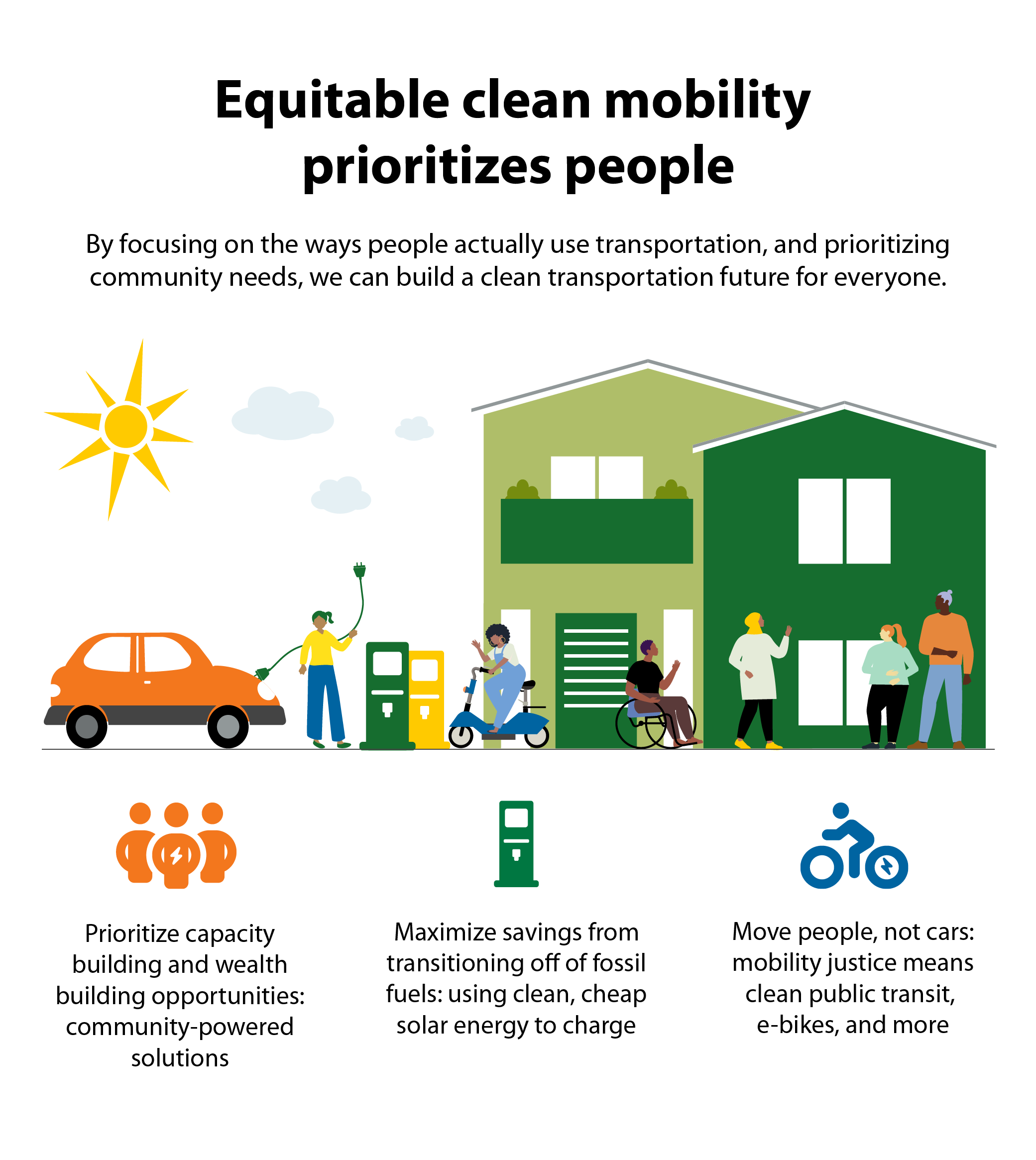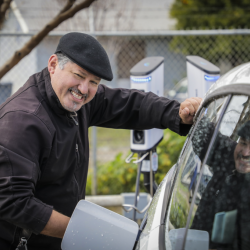At GRID Alternatives, we find solutions to global challenges that are better for people and the planet. Since GRID's founding 20 years ago, we have been a global leader in installing solar power at no cost, in the US, globally and in partnership with Tribes. As the nation's largest energy equity nonprofit, we envision a rapid, equitable transition to a world powered by renewable energy that benefits everyone. We also understand that our clean energy future will only be equitable with all communities working together to shape the solutions.
More recently, we have expanded our work to include other renewable energy technologies like electric vehicles and battery storage – building on the unique connections we have with the communities we serve and addressing their need for affordable, clean and reliable mobility options. Renewable energy is still at the core of GRID's work. But until recently, we couldn't use energy technologies like solar to address the most expensive, most polluting, and most unjust energy source that Americans use today: gasoline.
Last year, the American Council for an Energy-Efficient Economy found that many households spend as much as one-fifth of their incomes on gasoline. Since then, prices at the pump have nearly doubled, putting incredible pressure on already stressed household budgets. As a result, many families are forced to make impossible choices between getting to work, school and services, and paying for basic necessities like food and shelter – all of which also face pressure from historic levels of inflation.
The cost of driving a gasoline vehicle is clearly an economic equity issue, but it’s also an environmental and health problem. Transportation is now the largest source of greenhouse gas pollution in the US, and that pollution is growing. Gas-powered transportation is the largest source of smog and other local air pollutants that lead to enormous long-term health impacts. This pollution disproportionately impacts communities of color due to the legacy of redlining and the development of the interstate highway system that intentionally placed highways through communities of color. This is a multigenerational legacy of harm that goes beyond environmental harm; recent research ties the legacy of leaded gasoline pollution in these communities to the current epidemic of mass incarceration.
We now have the technology to replace gasoline with sunshine, which has the benefit of being better for the planet and dramatically cheaper for drivers to ‘fill up’. GRID knows that electric vehicles and clean mobility are powerful opportunities for reparation in communities that have borne the brunt of the gasoline economy. Shockingly, while there are many government and utility programs that help income-qualified families pay for home energy, there are no significant programs at the state or federal level to address the economic burden of gasoline. The price at the gas pump is the same for everyone, whether you're a billionaire or making minimum wage. GRID believes that the transition from gasoline to clean mobility options like electric vehicles is a generational opportunity to change that, and we are already working to make this change a reality.
More broadly, transportation electrification can serve as a powerful vehicle for economic development and wealth building. Based on our analysis of US Census data, the communities GRID serves spend well over $100 billion annually on gasoline – money that largely leaves local towns and cities to fund the global oil economy. Pairing access to electric vehicles with locally-built EV charging and solar power means keeping that money in the community to invest in local development priorities, while dramatically reducing gasoline burdens and pollution.
So what does this work look like on the ground? GRID is focused on three core program areas:
- Equitable Access to Electric Vehicles: GRID is working with state, regional and local agencies and utilities across the country to ensure equitable and affordable access to all types of electric vehicles. These projects include leading the California Air Resources Board (CARB) Access Clean California "one stop" EV equity outreach program; working with the Bay Area Air Quality Management District to implement their Clean Cars 4 All "scrap and replace" program; partnering with Xcel Energy to launch Colorado's first income-qualified EV incentives; partnering with the City of Oakland on their upcoming e-bike library; and helping tribal partners like the Cahuilla Band of Indians access funding for a tribally-run electric carshare. Our partners at the Greenlining Institute have outlined how these solutions can be implemented at the federal level, as part of the National Electric Vehicle Infrastructure (NEVI) Formula Program.
- EV Charging for every type of home: In addition to expanding access to EVs, we are launching programs to ensure these vehicles can be charged in every home and neighborhood. 80% of all EV charging takes place at home, which is both the cheapest and most convenient option. Depending on your electricity rate, home charging could mean the equivalent of $1/gallon gasoline while you sleep, or even less during the day when offset by solar panels. GRID provides home Level 2 chargers to income-qualified drivers throughout California through CARB's Financing Assistance programs and recently secured millions of dollars in funding to build out shared EV charging infrastructure at multifamily affordable housing – much of it solar powered.
- Public charging everywhere, for everyone: Our efforts don’t end there. The majority of folks in communities we serve are renters who can't currently charge at home, making them dependent on public EV chargers that can cost 2-3 times more. Starting in 2020, GRID has been partnering with EVgo, Beneficial State Foundation, Community Housing Development Corporation and CARB to pioneer the concept of subsidized access to public charging stations for 2,000 income-qualified EV owners.

As GRID grows and expands these programs in the years ahead, we are focusing on several key economic and environmental justice strategies:
Maximize savings from transitioning off of gasoline: Access and inclusion are not the same as measurable, tangible benefits for the communities we serve. To advance economic justice, we prioritize projects that deliver the deepest savings for transportation fuel, like home EV charging paired with local solar power. The difference between equity projects that deliver the equivalent of $1/gallon gasoline versus the equivalent of $3/gallon adds up to billions of dollars annually for our communities. We are also expanding partnerships with community finance nonprofits to connect drivers with equitable EV loans and protect them from predatory vehicle lending practices.
Move people not cars: Mobility justice means building expanded opportunities for folks to move freely to access employment, services, recreation and more. This requires thinking beyond just private vehicle ownership. Expanding access to shared mobility, e-bikes and public transit are powerful opportunities to deliver the benefits of clean mobility without the burdens of private vehicle ownership – car loans, insurance, registration fees, repair costs, and more. Since even individual household members often have dramatically different needs, communities need access to as many solutions as possible in our clean energy future.
Prioritize capacity building and wealth building opportunities: Beyond these immediate wins, GRID is making long-term structural investments in local community businesses and nonprofit organizations to sustain this work themselves. GRID is well-situated to drive project implementation funding to local electrical contractors of color, women and LGTBQ-owned businesses, and grassroots community based organizations, and to pair that funding with training and other resources to build long-term capacity. Long-term, this means building a renewable energy industry led by the same communities who have borne the brunt of gasoline pollution and other environmental harms.
We're looking for more partners who share these values, priorities, and vision. Together, we can advance equity-driven solutions to climate change and invest in the frontline communities ready to lead the way to our clean energy future. Reach out to us at cleanmobility@gridalternatives.org.
Photo: Scott Hoag

